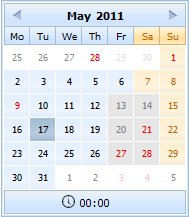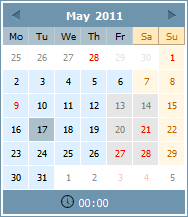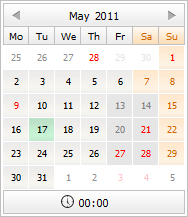Configuration
Setting skin
You can set one of the predefined skins by using the method setSkin() (see details):
myCalendar.setSkin('omega');
| 'dhx_skyblue' | 'dhx_web' | 'omega' |
|---|---|---|
 |  |  |
Attaching calendar to an input
When calendar is initialized as a date input field you can attach it to any number of inputs through the method attachObj() (see details):
myCalendar.attachObj("input3");// now in addition to inputs that 'myCalendar' is attached while initialization, it will be attached to input with the id 'input3'.
Then, if you want to detach calendar from some input you can use the method detachObj (see details):
myCalendar.detachObj("input3");
Changing start day of a week
You can control the start day of a week through the setWeekStartDay (see details). Week can start from any day:
//week starts from Monday myCalendar.setWeekStartDay(1); //week starts from Sunday myCalendar.setWeekStartDay(7);
Date formatting
You can use the default date format of calendar or set your own one.
The default date format in dhtmlxCalendar is '%Y-%m-%d'.
- A custom date format for the whole Calendar can be set with the help of setDateFormat method (see details):
myCalendar.setDateFormat("%d.%m.%Y");
- To get date in the specified format you should use the getFormatedDate() method (see details):
myCalendar.getFormatedDate("%d.%m.%Y", "2011-06-01");
Hiding/showing calendar
Calendar can be easily shown/hidden in the following way:
//to show calendar myCalendar.show(); //to hide calendar myCalendar.hide();
Hiding/showing time panel
You can define whether or not calendar will show the time panel (by default, the time panel is shown):
//to hide panel myCalendar.hideTime(); //to show panel myCalendar.showTime();
Making calendar multilingual
dhtmlxCalendar allows its users to add and use different languages with the ability to switch between them dynamically. First, you need to define necessary language settings. This can be done in the following way:
//settings for a new language (Russian) dhtmlXCalendarObject.prototype.langData["ru"] = { dateformat: '%d.%m.%Y', monthesFNames: ["Январь","Февраль","Март","Апрель","Май","Июнь","Июль","Август","Сентябрь","Октябрь","Ноябрь","Декабрь"], monthesSNames: ["Янв","Фев","Мар","Апр","Май","Июн","Июл","Авг","Сен","Окт","Ноя","Дек"], daysFNames: ["Воскресенье","Понедельник","Вторник","Среда","Четверг","Пятница","Суббота"], daysSNames: ["Вс","Пн","Вт","Ср","Чт","Пт","Сб"], weekstart: 1 }
When you have the necessary language settings, you can switch between them using
the loadUserLanguage() method (see details):
myCalendar.loadUserLanguage("ru");
Setting/getting date
To set/get the currently selected date you should use one of two respective methods:
//to set date myCalendar.setDate(date); //to get date var currentDate = myCalendar.getDate();
Setting holidays
You have a possibility to set holidays in calendar. The way holidays are rendered in calendar is determined by the CSS file. To set a date as holiday you should use the setHolidays() method (see details).
myCalendar.setHolidays('2011-09-25');// sets September 25, 2011 as holiday
Setting inactive dates
Use the methods disableDays(), setInsensitiveDays(), setSensitiveRange(), setInsensitiveRange() to set insensitive/inactive dates in calendar (such dates are dimmed).
//all dates starting from June 08, 2011 will be dimmed. Dates until June 08, 2011 will be active. setInsensitiveRange("2011-06-08",null); //all dates starting from June 08, 2011 will be active. Dates until July 08, 2011 will be dimmed. setSensitiveRange("2011-06-08",null); //June 10, 2011, June 17, 2011, June 18, 2011 will be dimmed. All other dates will be active. setInsensitiveDays((["2011-06-10",new Date(2011,5,17),"2011-06-18"])); //mondays, tuesdays and thursdays of each week in the calendar will be dimmed. All other dates will be active. disableDays("week", [1,2,4]);
Setting a new calendar's container
When calendar is initialized as an individual object you can change a container it's placed into by using the method setParent() (see details):
myCalendar.setParent("container2");
Setting calendar's position
When calendar is initialized as a date input field you can set the position pop-up calendar will appear from. For this purpose you should use the setPosition() method (see details):
myCalendar.setPosition('right');// 'bottom' by default